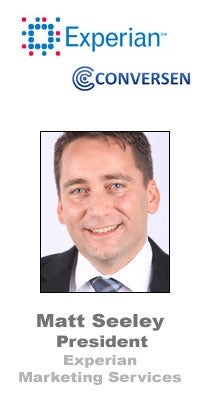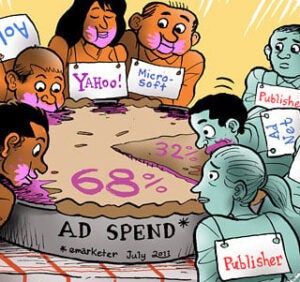 Matt Seeley is President of Experian Marketing Services.
Matt Seeley is President of Experian Marketing Services.
Seeley recently discussed his company’s acquisition of Conversen with AdExchanger. Conversen develops “interaction management technologies that enable marketers to create fully integrated, cross-channel conversations through mobile, Web, social, email and traditional channels,” according to the Experian press release announcing the purchase. Read it.
AdExchanger: For the the CMO, why should Experian’s acquisition of Conversen matter to them? Why should they care?
MS: The way I see the problem that the CMO faces is ‑‑ it’s a chicken and egg thing, where they’ve gotten what they asked for in the last five years, which is a large number of channels to speak to their customer given the explosion of social media and every other digital channel. The problem, of course, is – you’ve got all these channels. So, how do you use them effectively, get your message out, and stay consistent in your messaging? With the CMOs that I have talked to, they’re all struggling with that because many organizations have built in silos, in very specific channels.
Now, the first reaction to that statement may be to say, “Well, we need to get all of our data and information into one massive repository where we could study it and analyze it.” That’s a great long‑term plan.
The challenge with that is that it takes a long time. By the time you’re doing it, three more channels have popped up and the way to integrate those channels has changed.
Why a CMO should care about our acquisition of Conversen is we see a future of thin‑layer applications that can very easily integrate on top of the different, disparate systems you have. If you have an operating database, a call center database, an ecommerce database, or if you have your web analytics, what you need is a very light integration that allows the necessary information to flow into a tool. That tool allows that interactive channel targeting.
That’s what Conversen does. It’s an efficient, thin layer and easy to execute.
Along those lines, do you think a dashboard is possible for a CMO down the road where they can understand how their marketing to spend is performing?
It’s a big topic and one we talk about often. It’s the attribution question. If I was a CMO, that’s certainly what I would want. I’d want to be able to move those dials based on what the data’s telling me. My personal feeling is it’s going to take a long time. The reason it’s going to take a long time is ‑‑ take social media. How do you attribute the value of a posting and the network that it is carried through and the influence of your friends and your network in that actual sale? The way to attribute in social media is just fundamentally different than, say, a last click attribution for display, per se. It’s going to be hard. Each of the channels are different. My opinion is I don’t know if the CMO is going to get that anytime soon.
Taking you back to Conversen now, help me dive into a use case of how Conversen works as a part of Experian.
AdExchanger Daily
Get our editors’ roundup delivered to your inbox every weekday.
Daily Roundup
Let’s say you’re a travel company. You handle reservations, flights, and so on. What you want to be is relevant. For our use case, we’ll start with an email and discuss a desired effect. If a user browses a travel company’s site and they’re looking for flights to Florida because they’re going on vacation and they browse but don’t purchase – that is incredibly valuable information to the marketer.
Marketers need to be relevant and timely to get a message out there. Conversen allows us to do that. And, Conversen goes even further by saying, “We can extend that into other channels.”
For example, if we have a social media platform that is linked to your Twitter followers, and the user is following you, that may be the place to communicate. If it’s mobile and he’s given you permission to text him via SMS, MMS, maybe that’s the preferred channel. And then there’s creating life‑cycle streams to not only do it once, but to create a cycle so that we could ask, ‘Great, if John opened that email, what should we do next since he didn’t transact?” You need a workflow that allows you to run through a waterfall of things in the purchase funnel. That’s a use case where a lot of clients are today.
Quite frankly, the access to the information to make the trigger relevant is all over the place. Where Conversen helps is it gets the necessary information out of those systems quickly and easily with a thin layer to make that messaging relevant.
With the Audience IQ platform you announced last year and your display advertising services business – is there a fit here with Conversen?
To me, display is an additional addressable channel. Everything that we do around our Audience IQ suite is to make display addressable and relevant. Of course, it should be one of the arms extending from our interactive management. You could see how that neatly fits in over time helping the CMO. Using nearly the same use case in travel, let’s say I don’t have their permission in email, I don’t have their permission in mobile and they’re not a big Twitter follower, etc. Maybe the place I’ve got to go get aggressive is to find them in display. You can easily see how that starts to link in.
Recent buzz in the industry, has revealed a rumor about Salesforce buying Buddy Media and Oracle making its intent known regarding the acquisition of Vitrue. What’s your take on this sudden interest by large enterprise companies in the social marketing software space?
I would assume, if I’m Salesforce, Siebel or anybody else, that the market’s too big to ignore. Even if they’re not sure how all the dots connect, they know how critical the space is and how important it may be to their business model. No different than our sales.
We look at social as incredibly important arm of what we do. We own Techlightenment, which is part of our digital connections area of expertise.
Getting back to Conversen again, what might be a milestone or two that you’d like to see the acquisition achieve in the next 12-24 months?
We didn’t acquire Conversen to have a silo. We acquired Conversen as part of our multi‑channel marketing hub. That hub means that we want to be able to walk into that CMO’s office and say, “We can tell you the story of how important one‑to‑one messaging is, how important relevant targeting is,” and they’re going to say, “Of course.” We’re going to be able to follow it up and we’re going to say, “This isn’t a two‑year project to put all of your information in one place. This is a quick, light integration into your already existing systems so you don’t have a massive technical project on your side, and a challenge to execute.”
The key here is we’re a services organization. When you’re the CMO and somebody comes with just a technical plan, it sounds great. But then the question becomes, “Can you back it up by helping me actually execute in the channels?”
We are well‑positioned to do that because we’re loaded with services talent. From the CMO’s perspective, not only do we present the technical vision that’s easy to implement, but we free them up to be the strategic component while we do the heavy lifting of the day‑to‑day execution, which is what a lot of companies struggle with. And, our goal is to be able to do that across the channels.
Talking about your Audience IQ platform product, you’re acting as an agent – or agency – for the client. At the same time, you’re also selling your data products. Is there a conflict of interest potentially?
I hear what you’re saying. In any of the marketing services world, it’s a bit of an incestuous business. There are a lot of “frenemies,” too. But, we truly believe, from a media side, that there’s an incredible untapped potential to think about addressable markets, say, in display. Some clients will have partners, whether it’s their agency or others, who help execute that strategy, which is fine by us. What we want to do is bring our vast knowledge of direct marketing, addressable audiences, the power of our data, into those relationships to help the agency or the customer directly or through the agency.
All we want to do is make sure that they get to that point of relevancy. If their business model is through the agency, we are A‑OK with that. The reality is some clients manage their channels separately and they want a direct relationship with those different types of channels. We’re saying terrific. We can do that as well.
The market is fragmented in that way. As long as you’re straight with your client and your partners, it seems to work well.
Are you happy with where the Audience IQ platform is right now? Do you plan to continue to build it out?
I could not be any more excited about what’s happening in Audience IQ and our digital advertising suite. We’ve come a long way in a couple years when we had to almost evangelizing in the marketplace the value of relevant display targeting through data even though these are principles that have existed in direct marketing for decades. As I’ve watched our suite evolve, it’s been amazing to me as I sit at the table and go, “One of the biggest challenges the CMO has today is acquiring new customers.” That is it. They’ve got to acquire most customers.
By John Ebbert













